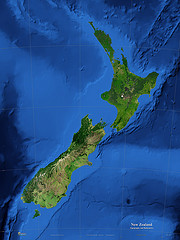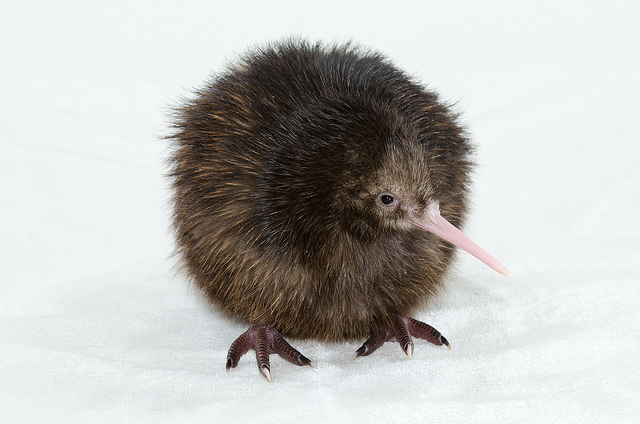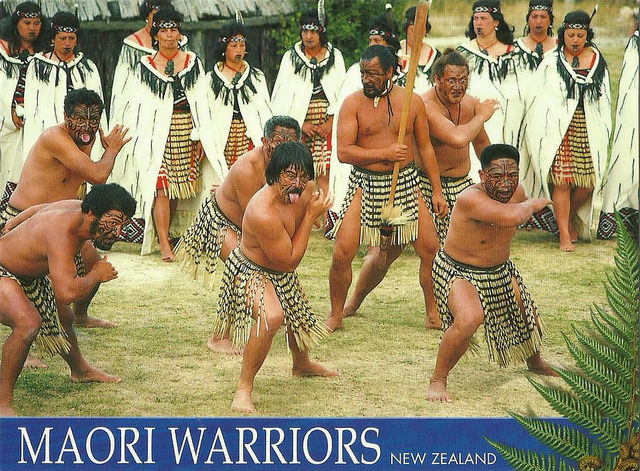Kiwi, the birds and the people. Posted by Gabriele on May 12, 2015 in Culture
This month I am going to present a series of posts spotlighting the English-speaking country of New Zealand. New Zealand is a very popular tourist destination, as well as a melting-pot* country. Many of you reading this blog have in the past, or may in the future, visit New Zealand, so let’s learn more about it!
A key vocabulary word to know about New Zealand is the word “kiwi.” This word has two very different meanings.
kiwi (n) – a flightless bird with hair-like feathers and a long curved bill that is native to the country of New Zealand
Kiwi (n) – a person from New Zealand
Note: The plural of the word kiwi is technically kiwi, without the –s, but sometimes you might see the word pluralized with –s. Both are okay.
You might also know of another meaning for this word ‘kiwi.’ Kiwi is the name for a brown hairy-skinned fruit with green flesh and black seeds. In the country of New Zealand this fruit is called a “kiwifruit” not “kiwi” to reduce any confusion.
The kiwi is the national bird of New Zealand and the nation’s icon. The kiwi is a very unique bird known for its flightlessness and curiosity. Like many of New Zealand’s native birds, the kiwi cannot fly at all. Kiwi and other birds in New Zealand evolved while there were no predatory mammals around, so they never needed to fly for protection, and eventually they lost the ability altogether. Although the kiwi is now an endangered animal, they were once endemic** on the islands of New Zealand. Unfortunately, when Westerners began traveling to New Zealand in the 1700’s they brought with them mammals, which kiwi were not prepared to live with in harmony. Over time people and other mammals led to the decimation*** of flightless birds, including kiwi, in New Zealand. In fact, kiwi have had a very hard time surviving since Westerners first arrived, but luckily for these bird, they are loved by the human Kiwi of this island! Kiwi birds are now protected with great enthusiasm in their native land and in some protected area in New Zealand the birds are making a comeback.
The term ‘Kiwi’ was first used to refer to the people of New Zealand around the time of the First World War and it has just stuck. It is much more common to refer to a person from New Zealand as a ‘Kiwi’ than it is to refer to them as a ‘New Zealander’, although both are appropriate terms. There were, of course, people living in New Zealand long before people here were called Kiwi. In fact, centuries before Westerns first arrived in New Zealand, Polynesian explorers traveled to these islands. These people, known as Maori, are the indigenous people of New Zealand. Today, Maori culture continues to have a strong impact on New Zealand as a whole. The Maori language, along with English, is one of the two official languages of New Zealand. Actually, the word “kiwi” is originally a Maori word! Today, Maori words are commonly used for names of natural places and towns in New Zealand. If you travel to New Zealand you will also see the Maori language, along with English, on government buildings and documents. Although the Maori language is culturally important it is not widely spoken as a native language in New Zealand. The current population of New Zealand is close to 4.5 million people; around 700,000 Kiwi are Maori, but only around 40,000 Maori adults speak the Maori language. English is by far the majority language in this country.
To finish of this post, the first in a series about New Zealand, here are a few facts about kiwi and Kiwi!
• There are five species of kiwi: Brown kiwi, Rowi, Tokoeka, Great spotted kiwi, and Little spotted kiwi.
• Kiwi (the bird) are mostly nocturnal.
• Kiwi have one of the largest egg-to-body weight ratios of any bird (the egg averages 15% of the female’s body weight).
• Only 5% of New Zealand’s population is human – the rest are animals!
• There are a lot of sheep in New Zealand – there are 7 sheep to every Kiwi.
• 22% of the people living in New Zealand were born overseas.
* melting-pot = a place where different peoples are mixed together
** endemic = regularly found in a place
*** decimation = the killing of a large part of a group of organisms

Build vocabulary, practice pronunciation, and more with Transparent Language Online. Available anytime, anywhere, on any device.
About the Author: Gabriele
Hi there! I am one of Transparent Language's ESL bloggers. I am a 32-year-old native English speaker who was born and raised in the United States. I am living in Washington, DC now, but I have lived all over the US and also spent many years living and working abroad. I started teaching English as a second language in 2005 after completing a Master's in Applied Linguists and a Certificate in English Language Teaching to Adults' (CELTA). Since that time I have taught ESL in the United States at the community college and university level. I have also gone on to pursue my doctorate in psychology and now I also teach courses in psychology. I like to stay connected to ESL learners around the world through Transparent Languages ESL Blog. Please ask questions and leave comments on the blog and I will be sure to answer them.






